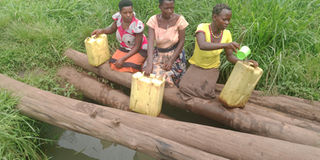Kikuube leaders decry worrying state of water and sanitation

Women fetch water in Kasungwa village, Butoole Parish, Kyangwari Sub Country in Kikuube District. PHOTO | BABRA ANYAIT
What you need to know:
- Mr Peter Banura, the Kikuube District chairperson attributed the poor sanitation to the high population of people in the area
Authorities in Kikuube have expressed concern over the lack of water and poor sanitation in the area.
Speaking during the Kikuube Councilors induction exercise held in Hoima City on Wednesday, Mr Peter Banura, the Kikuube District chairperson attributed the poor sanitation to the high population of people in the area.
“We are currently facing a big challenge of Hoima Sugar factory which has not gazetted faecal points, hence poor disposal that results in diseases like diarrhoea and others,” he said.
Meanwhile, Ms Mariam Akiror, the Advocacy and Strategic Partnership Coordinator at Action Against Hunger USA-Uganda Mission revealed that under the Right to Grow Project, they are implementing in the area with funding from Dutch Government, they are focusing on improving Water, Sanitation, Hygiene (WASH) and Nutrition security.
“We aim at reducing stunted growth in children under five. One of the ways is to provide clean and safe water to the population and also check hygiene issues in the homesteads,” she said.
Ms Akiror added: "We have managed to reach Kasungwa Cell in Kyangwali Sub County which is in a worrying state as far as Water, Sanitation, and Hygiene are concerned. We have helped over 2000 households with 8000 residents by constructing for them a spring well.”
She also revealed that, under the Swedish International Development Cooperation Agency (SIDA), they will be constructing over 50 pit latrines to try to address the challenge of open defecation in Kikuube District, in addition to conducting community dialogue for a mindset change on the WASH and nutrition components.
Ms Kyomukama Evaline, 35, a resident in the area said: “We drink unsafe water because we have no other option. Sometimes we get stomach pain, diarrhoea and typhoid because when it rains, our water points get contaminated. And the water fetching points are not safe for our children.”
Residents challenged district structures to put emphasis on access to clean water to improve sanitation and hygiene in the area.




